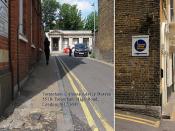The Order of the Day: Terror in the French Revolution
By 1792, the many of the issues that had led to the French Revolution in the first place continued to be unsolved. The French economy was still in steady decline, The newly introduced paper currency called the assagnat, had depreciated. And that along with bad harvests, and the rise of the price of sugar due to a slave revolt in Haiti, left food prices very high. War with major European countries seemed imminent. Austria, Prussia, and England in order to maintain the order of monarchy defended the French monarchy's right to rule their people and would be willing to fight for it. There was still a power struggle as to how the country would be ruled. There were those who wanted a halt, or reverse of the Revolution, and there were those who wanted further strides towards Democracy. And on top of that, "Out of fear, the King and his family tried to flee to Austria"(Brink), but were caught at the border between the two countries.
All these factors contributed to the Revolution taking a turn in a more violent direction. This violence is now called the "Terror" because of the politically motivated mass executions that took place during the French Revolution.
Shortly after the fall of the Old Regime, The National Assembly drafted the Rights of Man and the Citizen. The Rights of Man and Citizen was greatly influenced by Enlightenment thinkers. The Enlightenment and the ideas that came from it were extremely influential. During this time, France, like many other European countries, was caught up in the ideas of such men as Locke, Rousseau, and Montesquieu, among others. The National Assembly drew ideas from a renaissance thinker. In the Rights of Man, statements like "The source of sovereignty...


